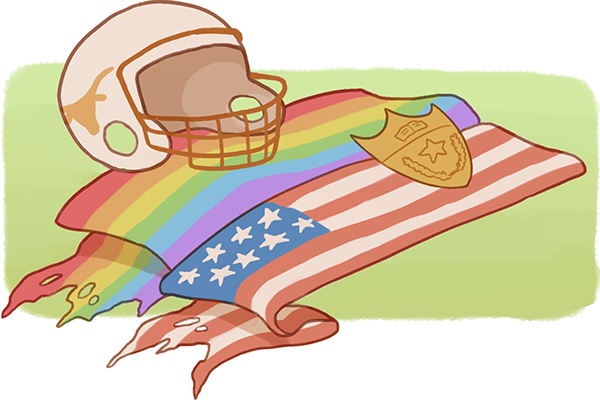The UT Police Department has introduced a LGBTQIA+ liaison, athletic liaisons and a military and veterans liaison to act as points of contact between law enforcement, students and employees in these groups.
The goals for the interest-based district representatives this semester include increased officer training and support for students. LGBTQIA+ liaison David Chambers said the representatives provide resources and representation within the department to different campus groups, some of which that have historically not had positive relationships with police.
“(The purpose of the liaisons is for groups to) have a resource to come talk to someone, but if there are things that we need assistance with, we can also go to them, and we have that relationship built,” Chambers said. “I believe we’re trying to develop these programs even more to include groups that historically may not have had the best relationship with law enforcement.”
The first official liaison was UTPD detective Chambers, who identifies as gay. Before the position was created in 2018, Chambers said he acted as an unofficial voice for the LGBT+ community within UTPD for years.
“It’s just been a passion of mine to make sure people feel they are represented and that they have a voice in our department, both as officers working in our department that may identify as LGBT, but also community members,” Chambers said. “Because, let’s be honest, you look at the history between law enforcement and the LGBT community, and it’s not always the greatest.”
Chambers said he is part of the LGBT+ steering committee headed by the Gender and Sexuality Center, which examines LGBT+ issues across campus. He said he is working on transgender awareness training to educate UTPD officers on how to appropriately interact with people of all gender identities.
Chad Garton, military and veterans liaison, said he served in the military after graduating as a cadet in the Reserve Officer Training Corps and currently works with UT’s ROTC program. UTPD officer Garton said he saw a need for veterans on campus to have a better understanding of resources available to them and is hoping to work with other campus veterans programs.
“Having been to combat myself, I can relate to these individuals, and if they have questions about anything that revolves around law enforcement or anything that revolves around operations from UT, hopefully I can help them out,” Garton said. “I’m also here to reach out and see if there are veterans that want to get into law enforcement when they get out of college … so we can have a well-trained professional police force that has a lot of veterans.”
Athletic liaisons Lt. Wayne Coffey and Sgt. Jimmy Moore, who are both former athletes, offer 24/7 access to advice and resources through their emails, Coffey said. They focus on helping athletes, especially football players, understand how to deal with being high-profile in life and on social media, he said.
“There’s been an instance where (on) social media … (UTPD) got involved and (people) were, in a sense, almost stalking the athlete,” Coffey said. “We will actually step in and help them in whichever way we can. Now that you’re an athlete at UT, all eyes are on you.”




















